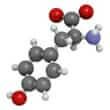Background
- Tyrosine is a nonessential amino acid, meaning that the body normally makes enough of it. Tyrosine is made from phenylalanine, an essential amino acid. Tyrosine is found in soy products, chicken, fish, almonds, avocados, bananas, dairy products, lima beans, pumpkin seeds, and sesame seeds. However, it is difficult to get enough tyrosine from food for medical purposes. For supplementation, tyrosine may be taken in tablet or capsule form.
- Tyrosine may be added to supplements to treat phenylketonuria, a birth defect in which people cannot process phenylalanine. As a result, they cannot make enough tyrosine and there is a buildup of phenylalanine in the body, which may harm the nervous system.
- Tyrosine is involved in the production of important chemicals in the body, such as dopamine, epinephrine, and norepinephrine. Tyrosine is thought to improve alertness, enhance mood, lower stress, and promote brain health. It is also believed to increase sex drive and reduce appetite.
- Tyrosine is also involved in the production of melanin, a compound that gives skin its color. Because of this, tyrosine is thought to play a role in skin conditions such as albinism (little or no color in the hair, skin, and eyes). It is also involved in the production of thyroid hormones and may be used to treat those with thyroid problems.
- Studies have looked at the potential effectiveness of tyrosine for improving brain function and treating depression, sleep disorders, Parkinson's disease, and schizophrenia. However, more research is needed before conclusions may be made.
References
Natural Standard developed the above evidence-based information based on a thorough systematic review of the available scientific articles. For comprehensive information about alternative and complementary therapies on the professional level, go to www.naturalstandard.com. Selected references are listed below.
- Barrett SP and Leyton M. Acute phenylalanine/tyrosine depletion: A new method to study the role of catecholamines in psychiatric disorders. Primary Psychiatry 2004;11(6):37-41.
- Belza A, Frandsen E, Kondrup J. Body fat loss achieved by stimulation of thermogenesis by a combination of bioactive food ingredients: a placebo-controlled, double-blind 8-week intervention in obese subjects. Int.J.Obes.(Lond) 2007;31(1):121-130. View Abstract
- Bjerkensted L, Farde L, Terenius L, et al. Support for limited brain availability of tyrosine in patients with schizophrenia. International Journal of Neuropsychopharmacology 2006;9(2):247-255.
- Ellis KA, Mehta MA, Murthy PJ, et al. Tyrosine depletion alters cortical and limbic blood flow but does not modulate spatial working memory performance or task-related blood flow in humans. Human Brain Mapping 2007;28(11):1136-1149.
- Hitsman B, MacKillop J, Lingford-Hughes A, et al. Effects of acute tyrosine/phenylalanine depletion on the selective processing of smoking-related cues and the relative value of cigarettes in smokers. Psychopharmacology 2008;196(4):611-621.
- Leyton M, Dagher A, Boileau I, et al. Decreasing Amphetamine-Induced Dopamine Release by Acute Phenylalanine/Tyrosine Depletion: A PET/ [¹¹C]Raclopride Study in Healthy Men. Neuropsychopharmacology 2004;29(2):427-432.
- Lythe KE, Anderson IM, Deakin JFW, et al. Lack of behavioural effects after acute tyrosine depletion in healthy volunteers. Journal of Psychopharmacology 2005;19(1):5-11.
- Magill RA, Waters WF, Bray GA, et al. Effects of tyrosine, phentermine, caffeine D-amphetamine, and placebo on cognitive and motor performance deficits during sleep deprivation. Nutr.Neurosci. 2003;6(4):237-246. View Abstract
- McLean A, Rubinsztein JS, Robbins TW, et al. The effects of tyrosine depletion in normal healthy volunteers: Implications for unipolar depression. Psychopharmacology 2004;171(3):286-297.
- Montgomery AJ, McTavish SFB, Cowen PJ, et al. Reduction of Brain Dopamine Concentration With Dietary Tyrosine Plus Phenylalanine Depletion: An [¹¹C]Raclopride PET Study. American Journal of Psychiatry 2003;160(10):1887-1889.
- Munafo MR, Mannie ZN, Cowen PJ, et al. Journal of Effects of acute tyrosine depletion on subjective craving and selective processing of smoking-related cues in abstinent cigarette smokers. Psychopharmacology 2007;21(8):805-814.
- Ryan MM, Sy C, Rudge S, et al. Dietary L-tyrosine supplementation in nemaline myopathy. J.Child Neurol. 2008;23(6):609-613. View Abstract
- Sutton EE, Coill MR, Deuster PA. Ingestion of tyrosine: effects on endurance, muscle strength, and anaerobic performance. Int.J.Sport Nutr.Exerc.Metab 2005;15(2):173-185. View Abstract
- Vrshek-Schallhorn S, Wahlstrom D, Benolkin K, et al. Affective Bias and Response Modulation Following Tyrosine Depletion in Healthy Adults. Neuropsychopharmacology 2006;31(11):2523-2536.
- Young SN. Psychopharmacology for the clinician: Psychopharmacologie pratique: L-Tyrosine to alleviate the effects of stress? Journal of Psychiatry & Neuroscience 2007;32(3):224.







